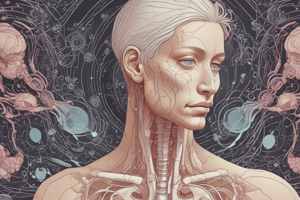Podcast
Questions and Answers
What are the two main categories of nutrients mentioned in the text?
What are the two main categories of nutrients mentioned in the text?
Macronutrients and micronutrients
What is the foundation of health according to the text?
What is the foundation of health according to the text?
Nutrition
What is the main function of bones in the skeletal system?
What is the main function of bones in the skeletal system?
Protect organs, support body frame, store calcium, and produce red blood cells
What are the three types of muscles in the muscular system?
What are the three types of muscles in the muscular system?
What is the role of ligaments in the skeletal system?
What is the role of ligaments in the skeletal system?
What is the largest internal organ in the human body?
What is the largest internal organ in the human body?
What are the common issues that can affect the teeth?
What are the common issues that can affect the teeth?
What are some functions of the liver?
What are some functions of the liver?
Why is the muscular system important for human health?
Why is the muscular system important for human health?
What are the components of a tooth?
What are the components of a tooth?
Flashcards are hidden until you start studying
Study Notes
Health Science: An Overview
Health science encompasses various disciplines aimed at promoting and maintaining human health. It includes fields like nutrition, skeletal system, muscular system, the liver, and teeth. Each of these subtopics plays a crucial role in overall health and wellness. Let's delve into each of them.
Nutrition
Nutrition is the foundation of health. It involves consuming foods that provide the necessary nutrients for growth and maintenance of the body. Proper nutrition includes balanced consumption of macronutrients (carbohydrates, proteins, fats, water, vitamins, and minerals) and micronutrients (vitamins and minerals). Poor nutrition can lead to several health issues, making it vital to maintain a healthy diet.
Skeletal System
The skeletal system comprises bones, joints, ligaments, tendons, muscles, and cartilage. Bones protect organs, support the body frame, store calcium, and produce red blood cells called osteocytes. Muscles attached to bones enable movement and support the body's structure. Joints connect adjacent bones, allowing for flexibility and mobility. Ligaments provide stability while tendons attach muscles to bones. Health issues related to the skeletal system include arthritis, fractures, bone cancer, and osteoporosis.
Muscular System
The muscular system includes three types of muscles: skeletal, smooth, and cardiac. These muscles work together to move body parts, maintain posture, regulate internal organs, and circulate blood. Diseases affecting the muscular system can cause weakness, pain, loss of motor function, and even death.
The Liver
The liver is the largest internal organ in the human body. It plays several roles, including detoxifying substances, producing bile to aid digestion, synthesizing proteins, and storing glycogen for energy. Liver diseases can lead to severe complications, such as cirrhosis, hepatitis, and liver cancer.
Teeth
Teeth are essential for oral health, enabling us to eat, speak, and maintain facial structure. They consist of enamel, dentin, cementum, and pulp. Tooth decay and gum diseases are common dental issues that can cause pain, tooth loss, and even heart disease if left untreated.
In conclusion, understanding health science involves studying these diverse aspects of human physiology. By promoting awareness about nutrition, skeletal system, muscular system, the liver, and teeth, we can strive for better overall health and wellness.
Studying That Suits You
Use AI to generate personalized quizzes and flashcards to suit your learning preferences.



